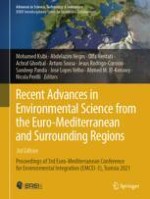2024 | OriginalPaper | Buchkapitel
Students’ Behaviors, Attitudes and Self-Assessment on Food Wastage in a Tunisian University Cafeteria
verfasst von : Hanen Ben Ismail, Layla Ben Ayed, Sarra Jribi, Darine Doggui, Hajer Debbabi
Erschienen in: Recent Advances in Environmental Science from the Euro-Mediterranean and Surrounding Regions (3rd Edition)
Verlag: Springer Nature Switzerland
Aktivieren Sie unsere intelligente Suche, um passende Fachinhalte oder Patente zu finden.
Wählen Sie Textabschnitte aus um mit Künstlicher Intelligenz passenden Patente zu finden. powered by
Markieren Sie Textabschnitte, um KI-gestützt weitere passende Inhalte zu finden. powered by
